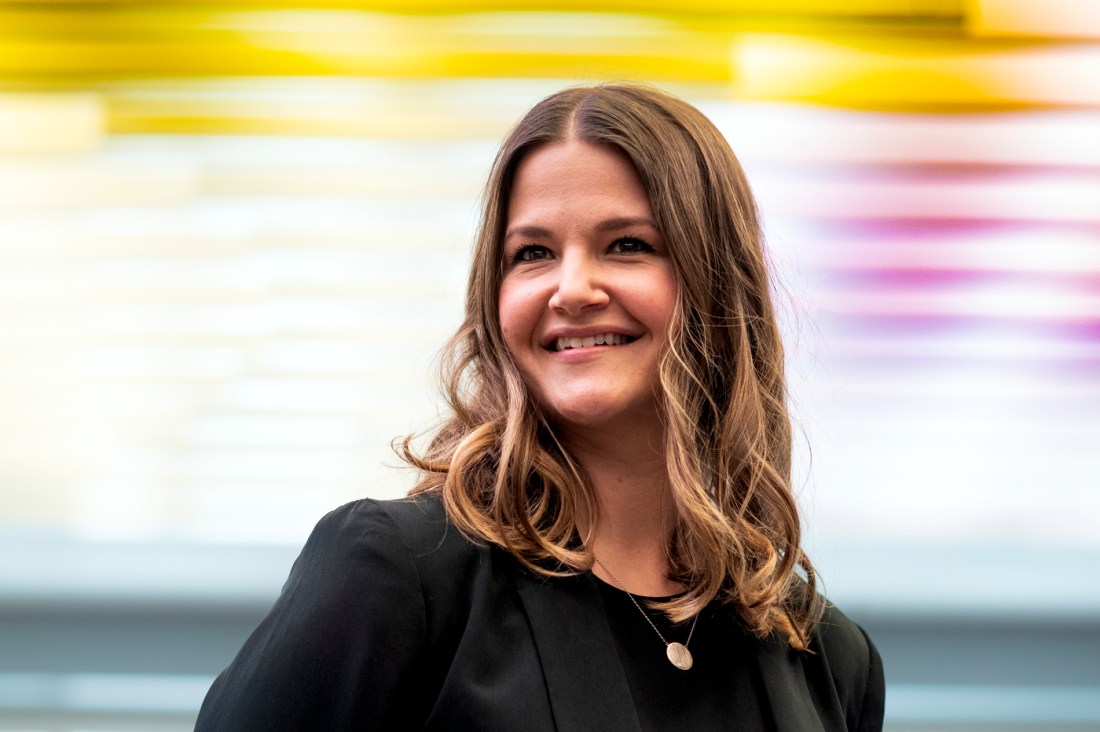Taylor Swift’s private jet usage sparks debate. Companies, not individuals, to blame for climate change, Northeastern experts say
Northeastern experts look at the 34-year-old “London Boy” singer’s green credentials and why fans want their pop stars to support causes they care about.

LONDON — For world touring pop and rock stars, using private jet planes can seem part of the job description.
But as Taylor Swift prepares to touch down on London’s tarmac once again for her final U.K. leg of the Eras tour, the megastar is being asked to rethink her own carbon-guzzling transport mode of choice.
BBC nature program presenter Chris Packham has urged the 34-year-old to “send a very symbolic gesture to millions of people” by declaring that she will “stop using those jets.”
Aviation is, according to the International Council on Clean Transport, responsible for 2.4% of global carbon dioxide emissions, which are a driver of climate change. Private jet journeys tend to be particularly fuel inefficient.
Packham said Swift should “be using [her] platform to lead and certainly not behaving as a rock star of yesteryear, traveling around the world in private jets.”
The naturalist was not the only group to target the U.S. star’s jet-setting during her visit to Britain in June. Two activists from direct action group Just Stop Oil sprayed orange paint over private jets at Stansted — the Essex, England, airport where Swift’s plane was thought to have landed — in protest at fossil fuel use.
Callum Barrell, associate professor of political thought at Northeastern University in London, says it would be “hard” to measure the environmental impact if Swift decided to forgo private jet travel because any calculation would likely be “speculative.”
Her PR team has previously stated that she purchased double the amount of carbon credits needed to offset her flights for the Eras tour.

But Barrell says the cost of offsetting — when flight passengers invest in carbon reduction projects in a bid to compensate for the amount put into the atmosphere during their journey — is often “too cheap” compared to the real cost of aviation pollution and sometimes the projects “do not happen”.
Barrell says: “The fact that she is kind of washing her hands of it by saying, ‘Well, I’ve got carbon credits — that’s fine.’ You basically pay extra for emitting all of this carbon and I think that is greenwashing and lazy.”
The environmental politics expert raises a separate question in the debate around Swift’s carbon usage. Should individuals be the ones examining their impact on climate change when multinational energy companies are responsible for the most emissions?
He explains that the idea of individuals measuring their carbon impact was a scheme first conjured up by BP, one of the largest oil companies and emitters of carbon emissions on the face of the planet.
“That whole discourse around ‘carbon footprint’ and the individualization of environmental responsibility — it came from BP,” says Barrell, who is head of sustainable curriculum on the London campus.
“There is an element in all of this which is, to what extent are we comfortable with putting the focus on individuals? Because that is the most convenient thing for oil companies in particular to do.

“Is there much we can do when, according to the IPCC (the United Nations’ Intergovernmental Panel on Climate Change), you have got 100 companies responsible for just over 70% of the world’s emissions?”
Barrell says that should not give the wealthiest individuals carte blanche to behave without regard to how their lifestyle affects the environment. He argues there should undoubtedly be a “spotlight on those people” when considering that the “top 1% of people in the world are responsible for almost as much of the global emissions as the world’s poorest 50%.”
Daniele Mathras, associate teaching professor of marketing at Northeastern, says Swift’s influence, with her 283 million Instagram and 32 million TikTok followers, could hold huge sway in encouraging further action on green causes if she were to give bigger backing to environmental campaigns.
The majority of so-called “Swifties” are in the millennial category (between 28 and 43) or aged 27 and under, and so are members of Gen-Z , according to a survey published last year by Morning Consult. In surveys, including one by Deloitte in 2021, those in the two generational groups regularly list climate change as one of their top concerns.
“If we are asking, would Taylor’s fans be receptive to her being more environmentally friendly,” says Mathras, “I think overall the answer is yes. I think if she were to do it, people would get on board because she does have so much influence over the lives of people.”
Swift — who will headline five sold-out shows at Wembley Stadium in just six days, starting Thursday, Aug. 15 — and other celebrities need to be aware, though, that inauthenticity when backing a cause like environmentalism can inspire just as much backlash as inactivity, Mathras warns.
“I think she would really need to build it into all aspects of her platform. I’m talking about sustainable travel; sustainable merchandise; maybe even platforms where people can share or give things for free; encouraging fans to offset their travel if they’re doing concert tourism.
Featured Posts
“It can’t just be like a Band-Aid,” continues the Boston-based assistant dean. “I think it has to be more holistic for it to be well received.”
While Swift is known for her philanthropy — the scale of her donation to a foodbank in Liverpool, England, following her gig in the city will allow it to provide a year’s worth of meals — she has not been as outspoken on green issues as others, Mathas points out.
That is not to say she is deaf to environmental concerns. Sustainability has been incorporated into previous live shows, Mathras recalls, including during Swift’s Reputation tour in 2018 when her team ensured biodiesel was used in tour buses and trucks, promoted recycling at venues and offered reusable merchandise options.
But the amount she takes to the skies has come under scrutiny in recent years. In 2022, U.K. marketing agency Yard, using unverified flight data available on social media, listed her as the number one celebrity CO2 polluter that year, with emissions claimed to be 1,100 times the amount of the average person.
Last year, the “London Boy” singer’s legal team sent a cease-and-desist letter to Jack Sweeney, who was tracking celebrities’ private jet usage using publicly available data. They claimed the student’s calculations of the carbon emissions per flight, which he posted on X, were a form of harassment and also misleading, given Swift was not on every flight.
The publicity has not stopped her from making journeys that appear to be related to her relationship with Kansas City Chiefs tight end Travis Kelce. As well as regularly zig-zagging across the U.S. to be at his games, the BBC reported that Swift in February took a 12-hour, 5,000-mile flight from Tokyo to Las Vegas to watch her boyfriend win the Super Bowl against the San Francisco 49ers.
But why is it that the public and fans care if celebrities are environmentally conscious? Mathras says it can often be the case that, just like with voters and politicians, consumers want their favorite pop stars to share the same ideals as them.
“Social identity theory would say we want [our] beliefs to be consistent,” she says. “Whoever I follow, whoever I vote for — that represents me. I include that in my self-identity and my social identity.
“We want those politicians to represent our beliefs and we want the music choices to represent our beliefs because people cannot deal with discrepancies.
“I think this notion of self-consistency is so important. When you don’t have that, you can feel alienated — ‘I’m part of this but it doesn’t fully represent me.’”











